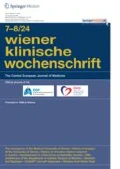Zusammenfassung
EINLEITUNG: Derzeit besteht ein Mangel an Studien, die den Einfluss einer Anastomosendehiszenz nach Rektumkarzinomresektion auf die Beckenbodenfunktion und Lebensqualität untersucht haben. METHODIK: Zwischen 1995 und 2006 wurde an einem Institut bei 500 Patienten mit einem Rektumkarzinom eine Rektumresektion durchgeführt. Sechsunddreißig Patienten (7.2%) entwickelten eine Anastomosendehiszenz nach der Operation. Davon verstarben 15 Patienten (41.6%) in der Nachbeobachtungszeit. Ein standardisierter Fragebogen, welcher den International Index of Erectile Function, Female Sexual Function Index, Short Form-12 Health Survey, International Prostatic Symptom Score, International Consultation on Incontinence Questionnaire-Short Form, Vaizey Incontinence Score und Wexner Constipation Score inkludierte, wurde an alle 21 lebenden Patienten geschickt. Patienten mit einer Rektumkarzinomresektion ohne postoperativer Dehiszenz dienten als Kontrollen für jeden Fall und wurden gematcht nach Geschlecht, Alter (±5), Art der Resektion und neoadjuvanten Therapie (Ja/Nein). ERGEBNIS: Sechzehn Patienten (76.2%) waren verfügbar und wurden in die Analyse einbezogen. Stuhlinkontinenz, Verstopfung und sexuelle Funktion zeigten keinen Unterschied zwischen Patienten und Kontrollgruppe (p = 0,1973, 0,1189, 0,8519). Allerdings war die Harnkontinenz signifikant beeinträchtigt bei jenen Patienten mit Anastomosendehiszenz (p = 0,0430). Die Lebensqualität zeigte keinen signifikanten Unterschied zwischen den beiden Gruppen (p = 1,0000 und 0,1973). ZUSAMMENFASSUNG: Eine Anastomosendehiszenz nach Rektumkarzinomresektion führt zu einer deutlichen Beeinträchtigung der Harnkontinenz. Stuhlinkontinenz, sexuelle Funktion, Verstopfung und Lebensqualität sind vergleichbar zwischen Patienten mit und ohne Anastomosendehiszenz.
Summary
INTRODUCTION: There is a paucity of studies assessing the influence of anastomotic leakage after rectal cancer surgery on pelvic organ function and quality of life. METHODS: Between 1995 and 2006, 500 patients underwent rectal resection for malignancies at a single institution. Thirty-six patients (7.2%) developed an anastomotic leakage postoperatively. Fifteen of these patients (41.6%) died during the follow-up period. A self-administering questionnaire including the International Index of Erectile Function, Female Sexual Function Index, Short Form-12 Health Survey, International Prostatic Symptom Score, International Consultation on Incontinence Questionnaire-Short Form, Vaizey Incontinence Score and Wexner Constipation Score was sent to all 21 alive patients. Patients with rectal cancer resection without leakage served as controls for each case and were matched by sex, age (±5 years), type of resection, and neoadjuvant therapy (yes/no). RESULTS: Sixteen patients (76.2%) were available and were included in the analysis. The median follow-up time was 106.8 months (32.4–170.4). Fecal incontinence, constipation, and sexual function did not differ significantly between patients and controls (p = 0.1973, 0.1189, 0.8519, respectively). By contrast, urinary continence was impaired significantly in the leakage group (p = 0.0430) but not in control patients. The Quality of Life assessing Short Form-12 Health Survey reached no significant difference between both groups (p = 1.0000 and 0.1973). CONCLUSION: Anastomotic leakage following anterior resection negatively aggravates urinary function but not fecal incontinence, constipation or sexual functions. The data indicate that patients experiencing anastomotic leakages can be relieved from the fear of gross pelvic floor function disturbances.
References
Dehni N, Schlegel RD, Cunningham C, Guiguet M, Tiret E, Parc R. Influence of a defunctioning stoma on leakage rates after low colorectal anastomosis and colonic J pouch-anal anastomosis. Br J Surg 1998;85(8):1114–7
Karanjia ND, Corder AP, Bearn P, Heald RJ. Leakage from stapled low anastomosis after total mesorectal excision for carcinoma of the rectum. Br J Surg 1994;81(8):1224–6
Vignali A, Fazio VW, Lavery IC, et al. Factors associated with the occurrence of leaks in stapled rectal anastomoses: a review of 1,014 patients. J Am Coll Surg 1997;185(2):105–13
den Dulk M, Marijnen CA, Collette L, et al. Multicentre analysis of oncological and survival outcomes following anastomotic leakage after rectal cancer surgery. Br J Surg 2009;96(9):1066–75
Nesbakken A, Nygaard K, Lunde OC. Outcome and late functional results after anastomotic leakage following mesorectal excision for rectal cancer. Br J Surg 2001;88(3):400–4
Bittorf B, Stadelmaier U, Merkel S, et al. Does anastomotic leakage affect functional outcome after rectal resection for cancer? Langenbecks Arch Surg 2003;387(11–12):406–10
Heald RJ, Moran BJ, Ryall RD, et al. Rectal cancer: the Basingstoke experience of total mesorectal excision, 1978–1997. Arch Surg 1998;133(8):894–9
Rahbari NN, Weitz J, Hohenberger W, et al. Definition and grading of anastomotic leakage following anterior resection of the rectum: a proposal by the International Study Group of Rectal Cancer. Surgery 2010;147(3):339–51
Ware J Jr, Kosinski M, Keller SD. A 12-Item Short-Form Health Survey: construction of scales and preliminary tests of reliability and validity. Med Care 1996;34(3):220–33
Vaizey CJ, Carapeti E, Cahill JA, Kamm MA. Prospective comparison of faecal incontinence grading systems. Gut 1999;44(1):77–80
Agachan F, Chen T, Pfeifer J, et al. A constipation scoring system to simplify evaluation and management of constipated patients. Dis Colon Rectum 1996;39(6):681–5
Rosen R, Brown C, Heiman J, et al. The Female Sexual Function Index (FSFI): a multidimensional self-report instrument for the assessment of female sexual function. J Sex Marital Ther 2000;26(2):191–208
Rosen RC, Riley A, Wagner G, et al. The International Index of Erectile Function (IIEF): a multidimensional scale for assessment of erectile dysfunction. Urology 1997;49(6):822–30
Lange MM, Maas CP, Marijnen CA, et al. Urinary dysfunction after rectal cancer treatment is mainly caused by surgery. Br J Surg 2008;95(8):1020–8
Sterk P, Shekarriz B, Gunter S, et al. Voiding and sexual dysfunction after deep rectal resection and total mesorectal excision: prospective study on 52 patients. Int J Colorectal Dis 2005;20(5):423–7
Hallböök O, Sjodahl R. Anastomotic leakage and functional outcome after anterior resection of the rectum. Br J Surg 1996;83(1):60–2
Jones OM, Stevenson AR, Stitz RW, Lumley JW. Preservation of sexual and bladder function after laparoscopic rectal surgery. Colorectal Dis 2009;11(5):489–95
Hendren SK, O'Connor BI, Liu M, et al. Prevalence of male and female sexual dysfunction is high following surgery for rectal cancer. Ann Surg 2005;242(2):212–23
Hassan I, Cima RR. Quality of life after rectal resection and multimodality therapy. J Surg Oncol 2007;96(8):684–92
Author information
Authors and Affiliations
Corresponding author
Rights and permissions
About this article
Cite this article
Riss, S., Stremitzer, S., Riss, K. et al. Pelvic organ function and quality of life after anastomotic leakage following rectal cancer surgery. Wien Klin Wochenschr 123, 53–57 (2011). https://doi.org/10.1007/s00508-010-1514-y
Received:
Accepted:
Published:
Issue Date:
DOI: https://doi.org/10.1007/s00508-010-1514-y

